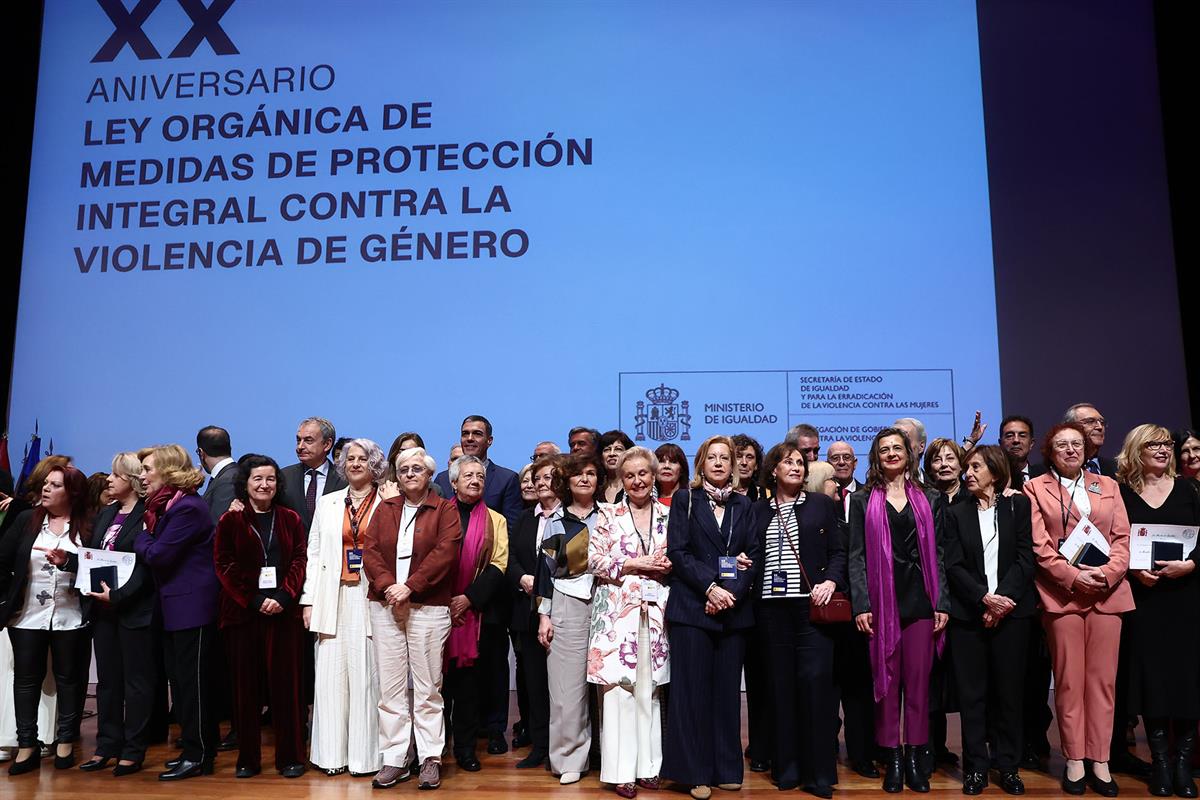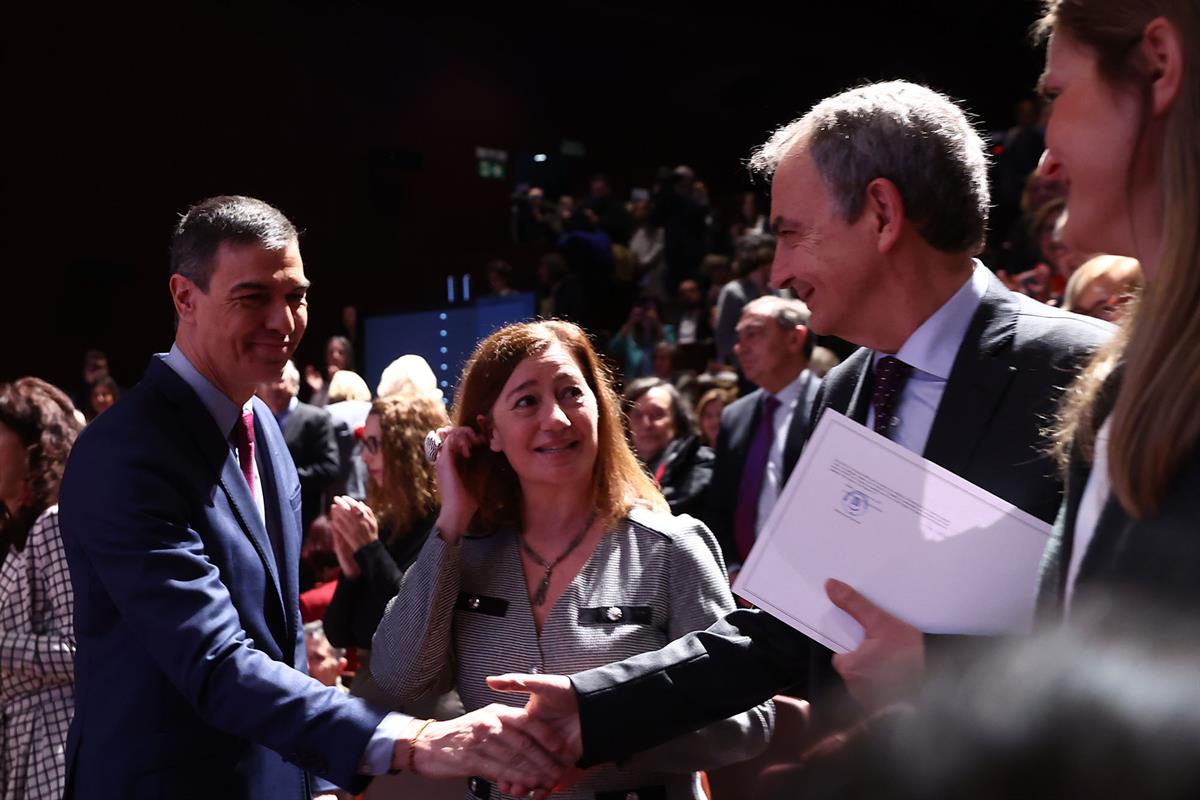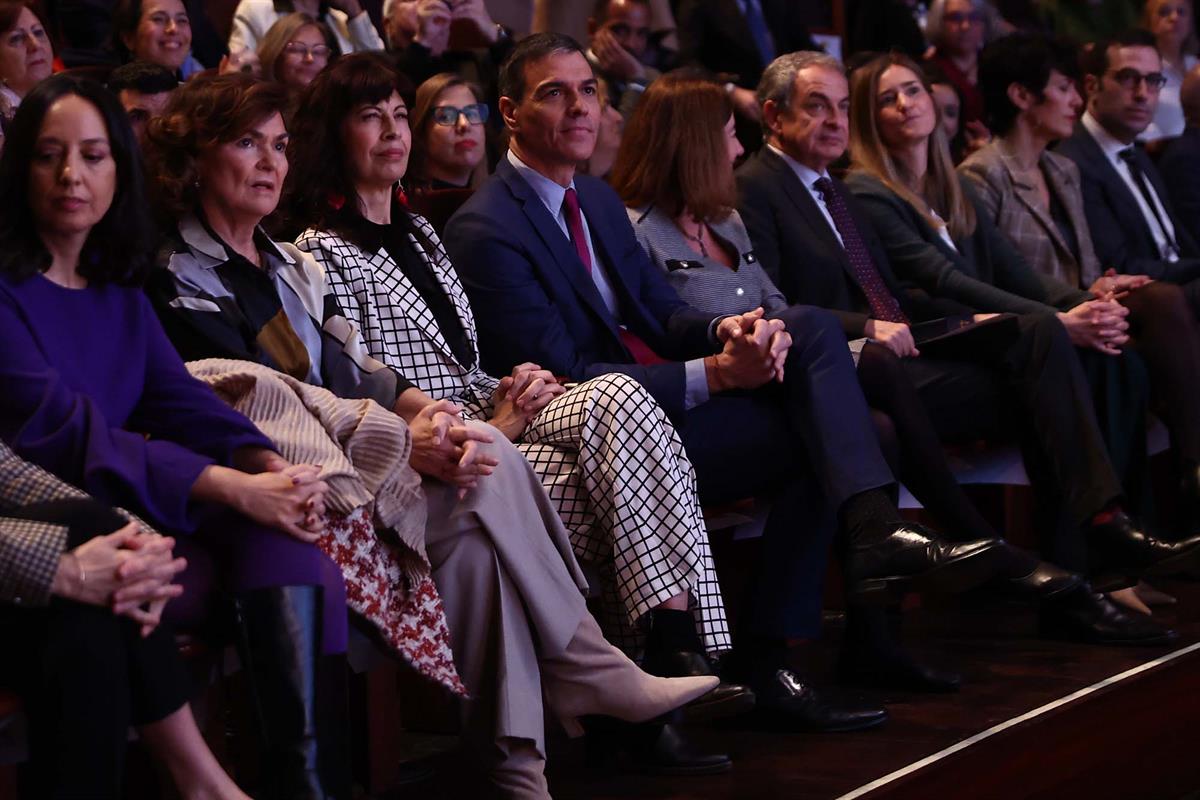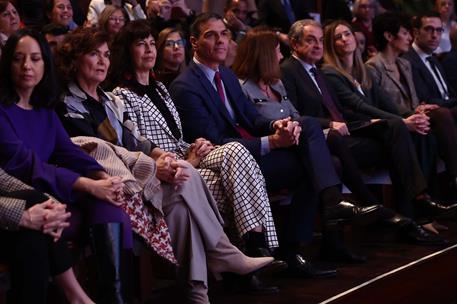Pedro Sánchez pledges to "work tirelessly" to renew the Spanish State Pact against Gender-Based Violence, "because it is fair, essential and a priority"
President's News - 2025.2.10
Reina Sofía National Museum and Art Centre, Madrid
 The President of the Government of Spain, Pedro Sánchez, together with the award winners for contributing to the legislative approval of the Organic Law on Comprehensive Protection Measures against Gender-Based Violence (Pool Moncloa / Jose Manuel Álvarez)
The President of the Government of Spain, Pedro Sánchez, together with the award winners for contributing to the legislative approval of the Organic Law on Comprehensive Protection Measures against Gender-Based Violence (Pool Moncloa / Jose Manuel Álvarez)
The President of the Government of Spain, Pedro Sánchez, stated that "we are going to work tirelessly to ensure that the renewal of the State Pact against Gender-Based Violence goes ahead", "because it is fair, because it is essential and because, furthermore, for this Government and for a very large majority of the General Courts, it is a priority".
As he explained, it is a pact that includes "400 new measures aimed at protecting minors, victims of vicarious violence; combating economic and digital violence; and fighting against sexual violence, the trafficking of women and girls for the purpose of exploitation, and forced marriages".
Sánchez expressed this commitment at the event held at the Museo Nacional Centro de Arte Reina Sofía to commemorate the 20th anniversary of the Law against Gender-Based Violence. This law is one with which "Spain took a giant step towards eradicating structural violence" and thanks to which "many women are still alive" today.
It is a law that was made possible by the government under President Zapatero, whom Sánchez thanked for "the commitment, courage and resolve necessary to say enough is enough" in the face of such infamy. "That law - dear José Luis - changed everything. So much so that if only this law had been the only one passed during the four years of that legislature, it would have been worth it", asserted Pedro Sánchez.
 The President of the Government of Spain, Pedro Sánchez, and the former President, José Luis Rodríguez Zapatero, greet each other in the presence of the President of Lower House of Parliament, Francina Armengol | Pool Moncloa / Jose Manuel Álvarez
The President of the Government of Spain, Pedro Sánchez, and the former President, José Luis Rodríguez Zapatero, greet each other in the presence of the President of Lower House of Parliament, Francina Armengol | Pool Moncloa / Jose Manuel Álvarez
The president extended his thanks to "each and every one of the women who were part of the feminist movement, pushing for and making this cry for equality and justice to be enshrined in the Official State Gazette"; and to the "Members who voted unanimously for this law. Because they sent a strong message to the whole of Spain, and that is that we are in this together."
Three main objectives of the law
The chief executive reiterated that this regulation, with which "Spain made history, the good kind of history", pursued three major objectives which, at the time, seemed unattainable. The first was to recognise something fundamental: that Spain was facing structural violence rooted in machismo. In fact, it pointed out that one in two women in Spain suffer from some kind of violence during her lifetime just because she is a woman. And in the last 22 years, 1,294 women have been murdered, leaving hundreds of children orphaned. Last year alone, this happened to 36 minors.
The second, he continued, was to "take gender-based violence out of the private sphere"; "to break the silence, to change the shame". He emphasised that "if there is silence that we still have to break today, it is that maintained by men", which led him to ask "how many men knew about the rapes of Gisèlle Pelicot and remained silent for years? How many could have raised their voices and did not do so? Everywhere this silence must end, because today it is still a deafening silence," he stressed.
Finally, "the third objective of the law is achieved by involving all the administrations, the judicial system and civil society on the same front", because "every woman murdered, every woman who suffers violence is a defeat for our democracy". He reiterated that this involvement in the fight against gender-based violence led to "all the tools under the rule of law to eradicate it" being used, resulting in alert and protection mechanisms being put into place, such as the VioGen system, specific courts and specialised training systems for police and prosecutors.
Strengthening the training of legal practitioners
On this last point relating to "training", Sánchez emphasised that "it would not be a bad thing to review some legal operators" in reference to the questions asked during the interrogation of the actress Elisa Mouliáa, "because that is where there should be less sexist bias".
"There are interrogations that do not remove doubts, but instead increase them. They don't mitigate the pain; they deepen it. Therefore, let us not allow malpractice, or a lack of empathy, to lead a single woman to question whether it is worth reporting violence against them," the president added.
Denials by the far right
 The President of the Government of Spain, Pedro Sánchez, attends the event for the 20th anniversary of the Law against Gender-Based Violence | Pool Moncloa / Jose Manuel Álvarez
The President of the Government of Spain, Pedro Sánchez, attends the event for the 20th anniversary of the Law against Gender-Based Violence | Pool Moncloa / Jose Manuel Álvarez
Sánchez regretted that, as opposed to 2017, "today it does not seem possible" to reach such a broad consensus as the one generated by the 2017 Spanish State Pact, given that "in this case, too, the denials by the far-right are on the rise", which "has important positions of power from which they are dedicated to inflicting more pain on the victims and instilling fear through lies, like when they speak about false allegations". "Voices that justify insulting or harassing a woman if she does not submit to sexual advances; that associate personal and professional success with a fragile, or toxic, idea of masculinity; or that lead many young men to base their identity on the absurd idea of women's submission to men," he proclaimed.
The chief executive explained that these voices, "who want to take us back half a century", are part of "a much broader international movement, which does not hesitate to take out the chainsaw on women's rights"; limiting a woman's right to decide about her own body; censoring books and plays, and manipulating language to the point of referring to intra-family or domestic violence for that which only has one name: gender-based violence.
"They want to take us back half a century", but "they won't be able to", because "there are more of us democrats. There are more of us proudly feminist men and women. And there are many more Spaniards who believe in a future that is free of violence. So many that we can make Spain a real benchmark," he stressed.
In this sense, the President of the Government of Spain highlighted the fact that Spanish laws and the Spanish model in terms of equality and the fight against gender-based violence "is a source of inspiration for many countries", because "it is the best system in the world". "We have come further than anyone else in half the time. We are not just trying to keep up with the rest; but to be at the forefront, as a true benchmark of equality." "May pride in all that has been achieved not make us forget what remains to be done, which is immense," he concluded.
Non official translation





